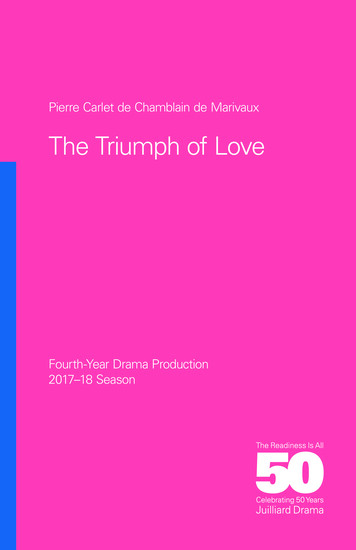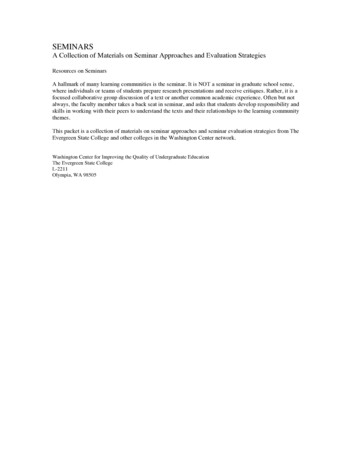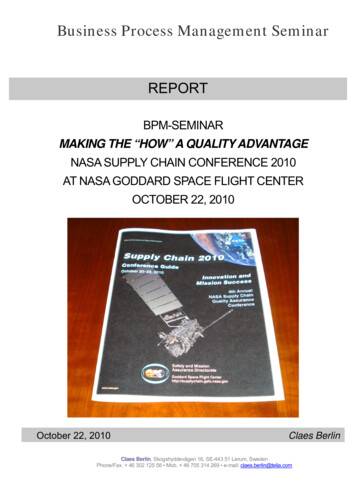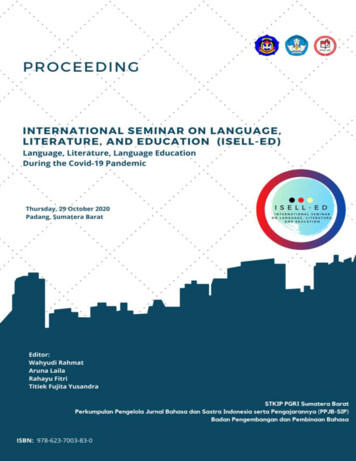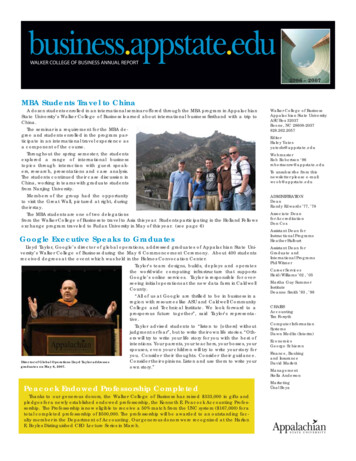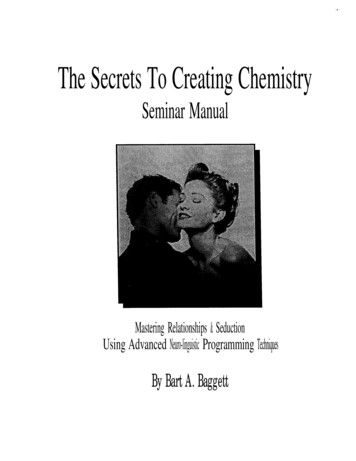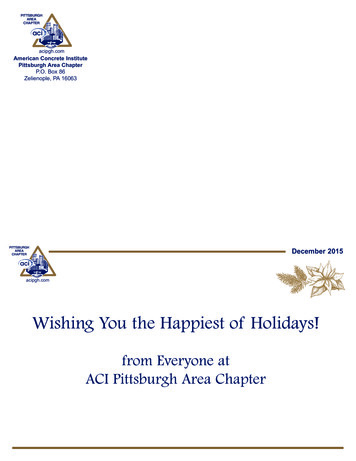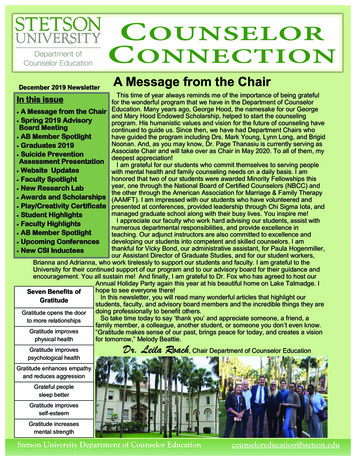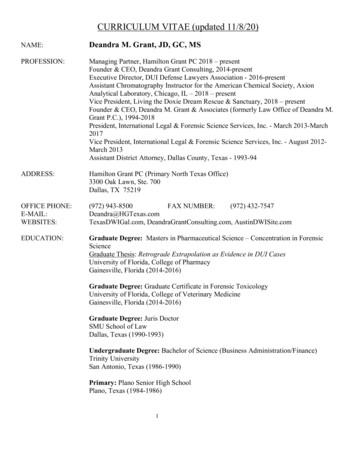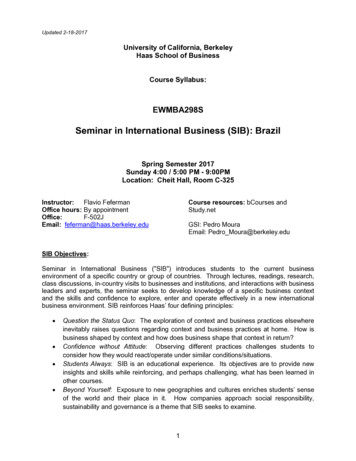
Transcription
Updated 2-18-2017University of California, BerkeleyHaas School of BusinessCourse Syllabus:EWMBA298SSeminar in International Business (SIB): BrazilSpring Semester 2017Sunday 4:00 / 5:00 PM - 9:00PMLocation: Cheit Hall, Room C-325Instructor:Flavio FefermanOffice hours: By appointmentOffice:F-502JEmail: feferman@haas.berkeley.eduCourse resources: bCourses andStudy.netGSI: Pedro MouraEmail: Pedro Moura@berkeley.eduSIB Objectives:Seminar in International Business ("SIB") introduces students to the current businessenvironment of a specific country or group of countries. Through lectures, readings, research,class discussions, in-country visits to businesses and institutions, and interactions with businessleaders and experts, the seminar seeks to develop knowledge of a specific business contextand the skills and confidence to explore, enter and operate effectively in a new internationalbusiness environment. SIB reinforces Haas’ four defining principles: Question the Status Quo: The exploration of context and business practices elsewhereinevitably raises questions regarding context and business practices at home. How isbusiness shaped by context and how does business shape that context in return?Confidence without Attitude: Observing different practices challenges students toconsider how they would react/operate under similar conditions/situations.Students Always: SIB is an educational experience. Its objectives are to provide newinsights and skills while reinforcing, and perhaps challenging, what has been learned inother courses.Beyond Yourself: Exposure to new geographies and cultures enriches students’ senseof the world and their place in it. How companies approach social responsibility,sustainability and governance is a theme that SIB seeks to examine.1
Course Summary: SIB BrazilThe course will introduce students to the current business environment in Brazil through visits tosome of the leading firms and institutions in the country, as well as through individualized orteam research. The theme of the course is Opportunities, Innovation, Adaptation and theBrazilian Business Environment. We will explore topics around opportunities in specificmarkets, how Brazilian companies innovate in these markets, entry and evolution of foreignfirms in Brazil, and how the business environment affects company strategy and promotesbusiness model adaptation.SIB Brazil includes two pre-departure class sessions, in-country meetings, and one debriefsession back in Berkeley. In 2017, the in-country portion of the trip will focus on three themesrelated to the Brazilian business environment: Corporate innovation and adaptation: How do local companies (and multinational firms)innovate in Brazil? How do they adapt their business models to the Brazilian businessenvironment? How do large firms interact with startups? Startup innovation: How is the Brazilian startup ecosystem evolving? What are the mainareas of opportunity? Do "institutional voids" provide business opportunities (andpotential competitive advantages) for local startups? Social impact: Some of our visits will also explore social/environmental impact andcorporate social responsibility.The program will be delivered through a blend of curriculum, company visits and meetings witha number of Brazil’s best known firms and experienced executives. We will utilize different typesof interactions, including presentations, interactive Q&A, expert panels and breakout activities.The learning objectives of the class include: Experience Brazil: business, market opportunities and business culture. Understand how context and culture shape business, promoting adaptation & innovation. Reflect upon the experience and apply the insights to your company, to opportunities inBrazil or in other markets, and to your own leadership style.Faculty Instructor: Flavio FefermanFlavio Feferman has been a member of the Professional Faculty at theHaas School of Business since 2008. He teaches courses on business,entrepreneurship, and innovation in developing countries and has led fiveexperiential learning programs in Brazil for Berkeley-Haas. In 2014 hereceived the Earl F. Cheit Award for excellence in teaching. He is currentlyCo-Director of the Berkeley-Haas Lean Launchpad entrepreneurial trainingprogram in Brazil. Flavio is also president of Developing Markets Group,which specializes in international consulting projects involving the UnitedStates and Latin America, with special focus on Brazil. During his 25 yearsof professional experience in business and economic development, Flaviodirected several international projects for organizations such as the WorldBank, the Inter-American Development Bank, and the U.S. Trade andDevelopment Agency, as well as projects for corporations, privateinvestors, and non-profit organizations. Flavio is a graduate of U.C.Berkeley and Stanford University, with advanced degrees in Business andEconomics. He is a native of Rio de Janeiro and resides in San Francisco,California, with his wife Deborah and daughters Tania and Julia.2
Areas of exploration for the trip, for your final team project, and for the reflection paper:Below are suggested questions and themes to explore during the company visits, Q&A sessionsin Brazil, as well as in your final research project and reflection paper. We will only address asubset of these topics during the trip, and the emphasis will vary from year to year depending onthe company visits scheduled: Market opportunities and trendso Currently, what are the most compelling market opportunities in Brazil? (Teamsmay address a specific industry sector or company)o What are the industry trends and competitive landscape in the Brazilian market?o What are the unique characteristics of Brazilian consumers (mobile use, socialmedia, online vs. offline purchasing, etc.)?o If you were a fund manager, venture capitalist, or private equity company, wherewould you invest?o Through the company visits, we will explore sectors such as technology,consumer goods, venture capital, health care, real estate, and infrastructure.Students are also free to pursue other sectoral interests. How does the business environment shape strategy and business models (market entryand adaptation)o What is unique about the Brazilian business and institutional environment? Whatare the major "institutional voids"?o How do MNCs enter and adapt to the Brazilian market?o How do local firms evolve in response to the unique aspects of the Brazilianmarket?o What are the major challenges faced by local Brazilian companies andmultinationals? (macroeconomics, regulation, infrastructure, shortage of skilledworkers, and generally the “Brazil cost”). How do companies address thesechallenges in creative ways?o How does the business environment (and institutional voids) shape businessstrategy and business models?o What are examples of creative business models? For instance, models targetingunmet needs (B2B, B2C), models addressing "institutional voids" as businessopportunities, or models focusing on lower-income customer segments? Entrepreneurship and venture capital in Brazil:o How are venture capital and the entrepreneurial “ecosystem” evolving in Brazil?What are the key gaps in the ecosystem?o How does the venture capital industry in the US compare to the VC industry inBrazil (e.g. external advisory board members in Brazil)?o What are the unique opportunities and challenges for Brazilian startups? (e.g.startups addressing the “custo Brasil”)o How do startups copy/adapt/create business models (what do you think of the“copy cat” strategy, so often used)?o How do startups identify customer needs, test, and validate (or pivot) businessmodels? How prevalent is the “Lean” approach in Brazil? Innovation:o How do Brazilian companies innovate? What are the sources of innovative ideas(internal resources, open innovation)?o What are examples of new technologies or creative business models utilized bycompanies in Brazil to address market opportunities?3
ooHow do business environment challenges shape innovation?What are the national policies to promote entrepreneurship and innovation inBrazil, and how effective are these policies? Internationalization strategies of Brazilian companies, international linkages, and culturalopenness:o A number of leading Brazilian firms (as well as startups) are expanding theirinternational presence. What is their international expansion strategy? How dothese firms adapt their business models to other countries? What are theirsources of competitive advantage in these markets?o In the introductory sessions, we discuss the cultural openness that characterizesBrazil (music, soccer, art). How is this cultural openness reflected in thebusiness sphere?o What are examples of international business linkages and partnerships? History, culture, politics and their impact on business: Students can also explore themesrelated to history, culture, politics and their impact on business. For example:o How does Brazil’s historical evolution influence the current economic andbusiness environment?o How does culture influence business (e.g., media and consumer marketingstrategies, organizational culture, business partnerships)?o How does Brazilian business culture differ from that of other countries?o What is the perspective of senior executives on company culture and leadership?o What is the impact of politics and government policy on business? For example,in previous years one student wrote a final paper on Brazilian labor laws andhuman resource policies of Brazilian firms; another student focused on women inbusiness. Environmental and social dimensions of business:o What are the most pressing social and environmental problems in Brazil?o How do corporations, startups (social enterprises), and non-profits addressenvironmental and social issues? What are some innovative practices?o How does the private sector collaborate with non-profits and communityorganizations?o What are some innovative practices and models to tackle environmental andsocial issues? How do these compare to other countries?These are examples of potential theme areas. Students will have an opportunity to explorethese themes during the company visits, through a panel on entrepreneurship as well asthrough assigned readings and by working on a team project. Students may also suggest otherthemes for their final team project based on their professional and personal interests.Itinerary and Company VisitsThe updated list of company visits and itinerary will be posted to bCourses and/or Google docs.Readings Book (selected chapters): Larry Rohter, Brazil on the RiseBook (selected chapters): Khanna, Palepu and Bullock, Winning in Emerging MarketsArticles to be posted to bCourses and Study.net4
Optional further resources on Brazil:o Moon Guide to Brazil (best and most compact guidebook for Brazil)o Michael Reid, Brazil: The Troubled Rise of a Global Powero Riordan Roett, The New Brazilo Werner Baer, The Brazilian Economyo Economist Traveler Briefing on Brazilo World Bank Doing Business Reporto Ghemawat, Managing DifferencesClass sessionsWe will have two class sessions before the trip and one class session following the trip,covering the following items:Class #1 (February 19, 2017, 5-9PM): Course Introduction, Logistics, and Brazil Overview Class introductionsOverview of syllabus: course objectives and requirements.Review of course themes: Opportunities, Innovation, Adaptation and the BrazilianBusiness Environment.Overview of itinerary, logistics, and safety.Discussion of companies that we will visit – we will assign teams of 3 students toprepare a summary presentation on companies on the following week. Students willchoose their own teams.Globesmart preparation: please use the same teams. Instructions will follow.Introduction on Brazilo Brazilian history and its reflections today.o Brazilian geography and regional characteristics.o Lecture on the Business Environment in Brazil (to be continued in class #2).Required readings for class #1 (about 90 pages, some of which can be skimmed): Larry Rohter: Introduction, Chapter 1, and Chapter 6. Provides a historical context anddescription of the recent "boom years" of 2004-2011. Foreign Affairs: How to Fix Brazil: Breaking an Addiction to Bad Government. On thesources of political dysfunction in Brazil; recaps some of what happened since 2011. McKinsey Global Institute: Executive Summary, Connecting Brazil to the world: A path toinclusive growth. An analysis of structural economic issues in Brazil. (You can skim thisreading, noting the main points). Economist: Time for Temer. Short article (3 pages) on the recent political transition andeconomic challenges. Economist: Doing business in Brazil, Rio or São Paulo? Short article (2 pages) on thetwo cities we will be visiting in Brazil.(Optional) Bring an interesting recent newspaper/magazine article on Brazil for classdiscussion. It can be about economics, business, politics, society, public health, music, art,history, sports, etc.5
Optional video on the impeachment of Dilma Rousseff:https://www.youtube.com/watch?v 7TWIE2psxZQAssignments due: Submit student bio and photo to the following SXBMCr2RYPcNRBMYS4MiJzuM2LC10qUbY/edit?ts 588d1a2cClass #2 (March 5, 2017, 4-9PM): Business Environment, Culture & Company DiscussionsFirst part of class: Lecture on Brazilian business environment (cont.) Discussion on business model adaptation (Khanna and Palepu reading) Discussion on cultural adaptationo Globesmart cultural assessmento Exercise on common interestso Brazilian culture slidesSecond part of class - Team Presentations: Team presentations on companies (3 studentsper team). Your presentation should cover the following items. It may be difficult to findinformation on all of the items below, but please do your best with the available information.1. Company overview: brief history, main products/services, size, growth, and otherfacts/figures2. Brief market overview: size, growth, competitors, trends3. Innovation and adaptations to the Brazilian market:a. How has the company been innovative?b. (If information is available:) What strategies does the company use toinnovate? For example, potential strategies may include: internal R&D andnew product development, internal entrepreneurial teams, open innovation,working with startups, corporate venturing, M&A, fostering innovation culture.c. What are some unique or innovative aspects of the company's businessmodel? E.g. tailoring offerings to local customers, channel strategy,partnership strategy, adapting to institutional voids (Khanna & Palepu book)4. SWOT analysis as a summary: Strengths, weaknesses, current strategic challenges &opportunities. (one slide with at most three brief points per box):5. Suggested questions/topics for the company visit in Brazil6. Bibliography (indicate the 1-2 best sources, with links if possible, so we can sharethese with your classmates)The presentation should be 10-15 minutes long 5 minutes for Q&A. We suggest 10PowerPoint slides, with a combination of images, graphs, and few short bullet points(please keep the detailed information in your speaker notes or appendix).Required reading ( 100 pages): Rohter, Chapters 2 and 3, on culture and race relations in Brazil HBR: Companies Don't Go Global, People Do Molinsky and Jang: To Connect Across Cultures, Find Out What You Have in Common Khanna and Palepu, selected sectionso Chapter 1, pp. 13-266
ooooChapter 2, pp. 27-44Chapter 3, pp. 53-58. (Optional: De Remate case study, pp. 68-71)Summary toolkit 4-1, pp. 123-125Chapter 5, pp. 127-134 (skim case studies, reviewing summary tables 5.3-5.7)(Optional): Again, bring an interesting recent newspaper/magazine article on Brazil for classdiscussion. It can be about economics, business, politics, society, public health, music, art,history, sports, etc.Assignments due: Company presentations. (Please submit your PPT to the GSI/Instructor before class;also send 1-2 best articles/links from you bibliography, to share with the class.) Globesmart cultural assessmentPre-departure/airplane readings (after class #2):ooRohter, Chapters 4 and 5 (Chapter 6 was assigned for class #1, and is also required).Brazil Startup Report, a 15-minute guide (PowerPoint)oo(optional) Rohter, Chapters 7 (Energy) & Chapter 8 (Amazon)(optional) World business culture: Brazil summary. Some good tips on business culture,but they overstate the importance of hierarchy in Brazil:o azil.htmlClass #3 (April 23, 2017, from 5:00-9:00pm): Post-trip wrap-up Assessment of company visits and experience as a whole. How did it compare with whatyou expected? Final team presentations (see instructions below) Discussion and wrap-up.Assignments and Grading:25%Participation and attendance:Full participation is expected. Your creative andconstructive involvement during class and during company visits is an importantcomponent of the course experience (quality of participation is more important thanquantity). Participation includes attendance and contributions to the two pre-trip classes(including the Globesmart assessment), all in-country meetings, and wrap-up session atBerkeley.20%Pre-trip company presentations. Presentations should be conducted in teams of 3students (one team will have 2 students) and will take place during the second classsession. The objective of the company pre-briefings is to familiarize all students withthe companies that we will visit and to prepare questions/topics to discuss during thevisits. A secondary objective is to work on presentation skills and techniques.Please see Page 6 for the suggested presentation outline. I will post a PowerPoint deckto bCourses called Presentation Design Principles by Doy Charnsupharindr, withuseful tips and guidelines. Kindly follow the principles discussed in this presentation.7
30%PowerPoint team project: Please self-organize in teams of 3 for this assignment (oneteam will have 2 students). We encourage the class to maintain the same teams as thecompany presentations. The final project should focus on one of the following two topics:(a) An “Investment Pitch”: An assessment of a specific industry or business opportunityin Brazil, particularly as it relates to your company, industry focus, or area ofprofessional experience. Be sure to cover the following elements: Clearly state your thesis at the beginningSet the context (you may analyze how the institutional environment influencesthis business opportunity)Provide the analysis and rationale for this business opportunityWrap-up: conclusions/recommendations, call to action and next steps.(b) An analysis of another aspect of the Brazilian business environment (see suggestedtopic areas and examples at the beginning of the syllabus; other topics can be arrangedwith the instructor). Tip: it’s better to focus on a specific topic rather than attempting tosummarize various aspects of the Brazilian business environment. You may compareBrazil to another country or countries, as part of the analysis.Teams should prepare the following: Powerpoint for class presentation: using images, graphs and few bullet points.We suggest 10 slides as a general guideline. Please submit this version by4:00pm on April 23rd (one hour before class begins) Final version with supporting documentation: a version with more explanatorytext, data analysis, and supporting documentation, including a bibliography. Thissupplemental information can be added to the main slides or included as aseparate appendix. We suggest 15-20 slides as a general guideline for the finalversion of the PowerPoint. The final version can be submitted any time betweenApril 23rd and April 26th at 11:59pm. Extra time is provided so that teamshave the option of incorporating feedback received during the April 23rd classpresentation.The final PowerPoint should go beyond just presenting facts and data: it should containa thoughtful analysis based on the company visits, review of literature, and otherresearch and analysis activities. The presentation should also tell a coherent "story".Optionally, students are encouraged to apply analytical frameworks and methodslearned in their MBA studies in the PowerPoint presentation. The PowerPointpresentations will be evaluated based on the following criteria:ooooooClear thesis and a compelling story (recall storytelling session with David Riemerduring PFPS or Applied Innovation Week )Supporting research, including class readings and other information sources, asneededInclusion of relevant insights from company visits, when appropriateQuality of the analysis, thoughts, and opinionsQuality of the PowerPoint and creativityClass presentation during the wrap-up sessionAgain, for the class presentation please follow the principles in the PowerPoint deckPresentation Design Principles posted to bCourses.8
FAQs on Final project Utilize information from company visits, research, class discussion, and othersources. Combine objective data, your synthesis of those data, and your own analysis andconclusions. The presentation should provide a thoughtful analysis. Students are encouraged to apply analytical frameworks and methods learned intheir MBA studies. Use multiple data sources (primary or secondary). Cite the sources of your data, including data used in graphs.25%Individual reflection paper: The reflection paper should be 4-6 pages long (doublespaced). You can focus on personal aspects of the experience, on your insights aboutthe Brazilian business environment, on your project team dynamic, or on all of theabove. Below, please find a few sample questions to guide your reflection paper. You donot need to address all topics or all questions, but we expect thoughtful analysis andreflection. Questions about the Brazilian business environmento What was unique or unexpected about your experience in Brazil?o What is unique about Brazilian business leaders and their companies/organizations?o How does the market context and institutional environment influence business?o How does culture influence business? What are the implications?o Did you identify specific business opportunities in Brazil for your company (thismay also be addressed in the Final PowerPoint project)?o How does Brazil compare to the US or to your native country? Do you see theUS (or your native country) in a different light after your experience in Brazil? Questions about your personal experienceo What motivated and inspired you during the trip?o What challenged you?o What were you most proud of?o What did you discover about yourself? About your values and culture?o What leadership lessons did you learn?o Did the Globesmart assessment provide relevant insights for Brazil? What werethey main cultural "gaps"? Did you engage in any type of "style switching" inBrazil?o What learnings can you apply to another country or situation?o What changes will you make going forward based on what you’ve learned? Questions about your project team experience.o How was your experience with the team project dynamic? What worked well?What aspects could have been improved?o Did the Globesmart assessment provide relevant insights for your team project?What were the main work style "gaps" across the team? Did you engage in anytype of "style switching" over the course of your interaction with the team?The reflection paper is due on Sunday, April 30th by 11:59pm. Papers received after this datewill receive a mark-down, and no papers can be accepted beyond Sunday, May 7th. Thanks foryour understanding.9
Haas School of Business Course Syllabus: EWMBA298S Seminar in International Business (SIB): Brazil Spring Semester 2017 Sunday 4:00 / 5:00 PM - 9:00PM Location: Cheit Hall, Room C-325 Instructor: Flavio Feferman Office hours: By appointment Office: F-502J Email: feferman@haas.berkeley.edu Course resources: bCourses and Study.net GSI: Pedro Moura


